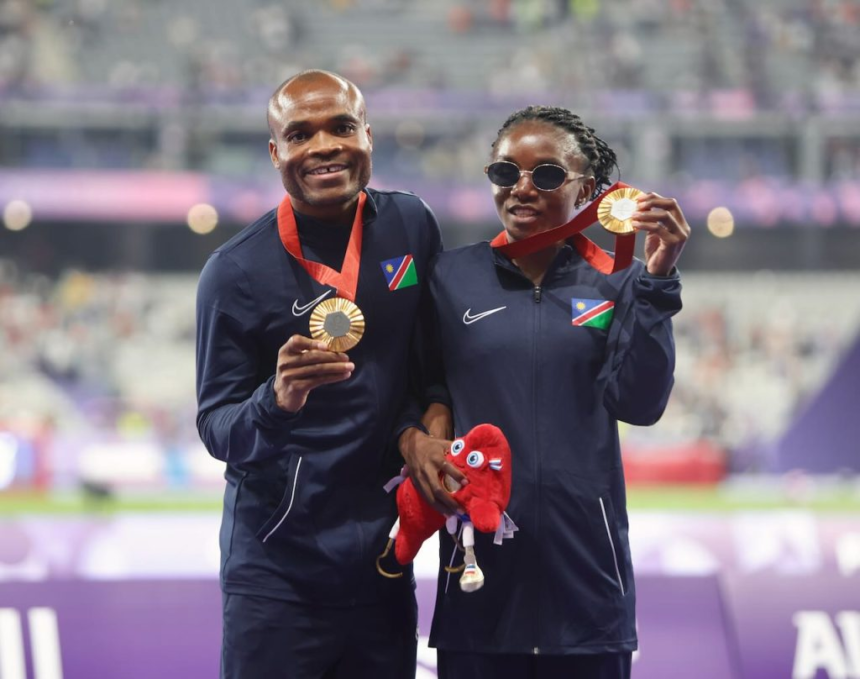There is one certainty in Namibian sport: the Paralympic team always brings medals home.
That constant has been true since Reginald Benade won Namibia’s first Paralympic Games medal, a bronze in the men’s F35/36 discus throw at the 2008 Beijing Paralympics.
Track trailblazer Johanna Benson took on the baton at London 2012, becoming the first Paralympic gold medalist in Namibia’s history when she won the women’s T37 200m.
She also got a bronze in the 100m.
At the 2016 Paralympics in Rio de Janeiro, Ananias Shikongo and Johannes Nambala took Namibia into a new realm of excellence, winning five medals between them.
The decorated Shikongo was the standout performer after setting a Paralympic record time when winning the men’s T11 200 final, while he also won bronze in the T11 100m and 400m sprints.
The equally medal-laden Nambala won two silvers in the men’s T13 100m and 400m in Rio.
The pair also reached the podium during the Covid-19 delayed Tokyo Paralympic Games in 2021. Nambala got silver in the 400m, with Shikongo bagging silver in the 400m.
This year, Lajha Ishitile, along with her trusted guide Sem Shimanda, took centre stage as she claimed a gold and bronze double in Paris, ensuring that Namibia maintains its record of medalling at every Paralympic Games it has been part of.
Ishitile’s barnstorming run to victory was far from surprising, having performed similar feats in Paris last year when she broke the African record three times on her way to claiming a World Para Athletics Championship silver.
“Let’s respect, honour and reward them and their support structures. As the saying goes, ‘at the Olympics, heroes are made and at the Paralympic Games, heroes come’,” Ishitile’s coach Letu Hamhola says.
“It’s time that Namibia gives the necessary respect to our Paralympic legends. For example, the list of rewards when we returned from the 2020 Tokyo Olympics and Paralympic Games was evident. Who got more and who got peanuts?
“Able-bodied athletes get employment because of sport but our Paralympic legends must beg. We only remember them every four years, next stop 2028, when we are done with them in Paris,” Hahmola observed.
In May this year, Ishitile and Shimanda won bronze in the T11 women’s 400m finals at the 2024 World Para Athletics Championships in Kobe, Japan.
Chris Kinda and his guide Kelvin Goagoseb were the star performers for Namibia at the championship, winning the T11 men’s gold.
The performances earned Namibia an extra Paralympic Games slot.
Namibia Paralympic Committee (NPC) secretary general Michael Hamukwaya says the advancement of positions and the acquisition of a new slot for the Paralympic Games is something to be proud of.
“Having a new young athlete crowned as world champion is brilliant. This shows there is potential, and we are happy to have a new world champion, something we did not have for a long time,” he says.
Hamukwaya says NamPower and the Ministry of Sport, Youth and National Service should be applauded for consistently funding the NPC as it demonstrates their trust and belief in the Paralympic movement.
GREATER HEIGHTS
After the annual Rössing Marathon in March, Hamukwya and wheelchair cyclist Roodley Gowaseb, called on domestic competition organisers to include Paralympic categories in their events and not just grant them token participation entries.
“This year, we decided to take an extra step and entered two of our elite wheelchair para-athletes to compete in the 42.2-kilometre race for people, including the organisers, to realise that Paralympics are not just about participation, but can also be competitive,” Hamukwaya told Nampa.
Gowaseb, who harbours ambitions of qualifying for the Commonwealth Games next year, said the prize money will come in handy when preparing for international competitions.
“We truly want organisers of these events to consider including us because as it stands, we are really struggling to finance these trips,” Gowaseb said.
“As much as we want to enhance our skills and improve our times, attending as many competitions as possible is challenging because we have to seek funding for everything ourselves.
“If we do not have an opportunity to win any prizes, then we cannot do that,” said Gowaseb.
NamPower, who are Disability Sport Namibia’s primary supporters, are in agreement. The power utility says its support for the movement is centred around mutual respect, individual growth, and empowering the athletes’ to reach for greater heights.
“Namibia’s Paralympians rarely disappoint when competing internationally. Therefore, they should be rewarded for continuously flying the country’s flag high,” NamPower managing director Simson Haulofu said in November when recognising the athletes’ achievements.
“It’s not just about coming back with medals; just qualifying for competitions of this magnitude is a commendable achievement already.
“Corporate Namibia should step up and establish more sponsorship programmes to reward athletes with prize monies, as our collective prize monies will mean a lot.”
Stay informed with The Namibian – your source for credible journalism. Get in-depth reporting and opinions for
only N$85 a month. Invest in journalism, invest in democracy –
Subscribe Now!


